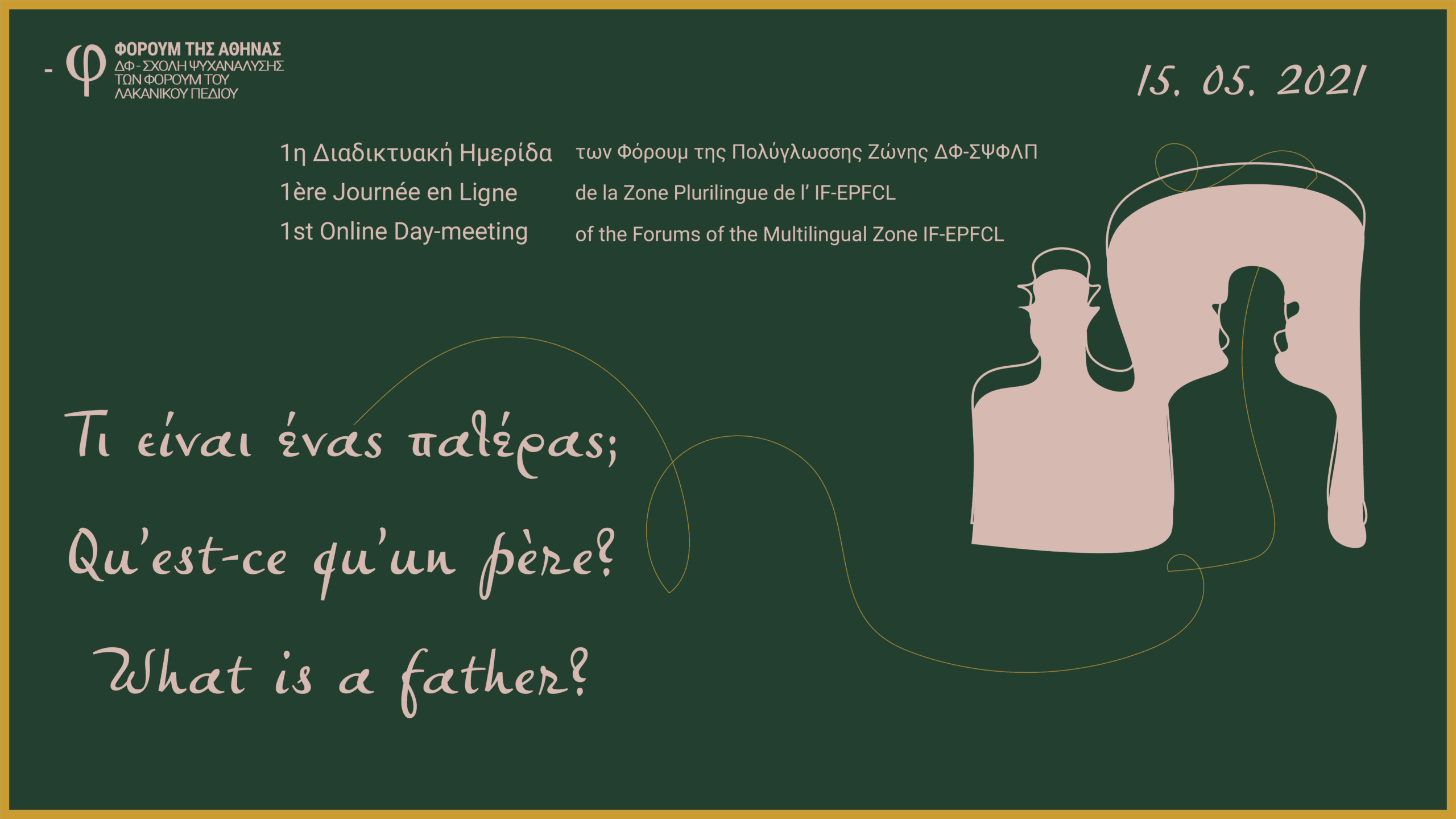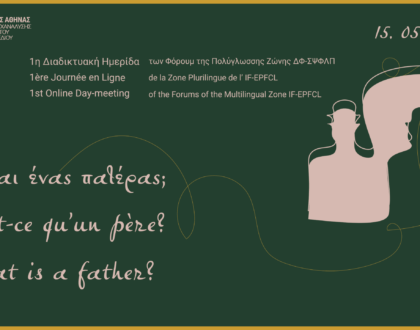What is a father?

Predule FCL Athènes
1st online Day-Meeting of the Forums of the Multilingual Zone IF-EPFCL
This question has been at the core of psychoanalysis since its beginnings.
Freud illustrated this fact by attributing to the father a position that “instigates neurosis”[1] in general, and hysteria in particular, via the theory of seduction. Such is the position from which he neither excludes himself nor his own father. However, he swiftly gives up the seductive father[2], for the Oedipus complex which appears shortly after, for the first time[3].
It is worth mentioning that this reference appears just a year after his own father’s death.
Thus, he performs a shift from the theory of trauma to the theory of fantasy. The fantasy in question, though, presents a logical articulation where the father continues to be in a central position[4].
Freud will never stop putting the father at the core of his elaborations; to this end, he resorts to three myths, one of which – that of the father of the primitive horde – he invented himself. These myths are the following: Oedipus, Moses and Totem and Taboo, the latter being “the only myth of which the modern age has been capable of”[5].
All three myths refer to the dead father, to the murdered father to be more precise. It is the father who imposes the law forbidding incest, who introduces the subject into the symbolic order, allowing it to access desire.
Lacan maintains that Freud “demystifies the father function” [6].. He demystifies it in the sense that he turns it into a metaphor.
When Freud invokes the phrase of Roman law pater semper incertus est[7],, the father is always uncertain, he reduces him to a simple signifier, a name existing only through metaphor.
Freud uses the myth for what it is, meaning a way of approaching, an attempt to articulate a real, “the attempt to give epic form to what operates from the structure”[8] as Lacan specifies the latter goes beyond the myth and articulates the father as a structural tool, something that is determined by language.
Thus, castration is no longer an effect of the father. “Castration is the real operation introduced by the impact of any signifier at all, on the sexual relationship. And it goes without saying that it determines the father as being this impossible real”[9].
This position has a decisive impact on the direction of the treatment and the analyst’s mode of interpretation, which now goes beyond the “game of apologetical mythemes” [10] and considers the father as something that one may make use of: “The hypothesis of the Unconscious, as Freud underlines, is something that can only hold up by supposing the Name-of-the-Father. The Name-of-the-Father supposition primarily refers to God, for sure. This is why psychoanalysis, by succeeding, proves that one can do without the Name-of-the-Father. One may as well do without it provided that one makes use of it” [11].
This phrase is crucial and every word has its own weight. The unconscious is a hypothesis, a supposition based on father-god, something that refers directly to love, since “the first thing to love in this world is the father”[12].
Love and supposition are the two pillars of transference. We love the subject to whom we suppose knowledge. In short, both in the transference and in the Name-of-the-Father we are dealing with a supposition that triggers love.
In analysis, Lacan’s teaching allows us not to get lost in the subject’s mythical labyrinths but to follow the thread of the reality of jouissance instead.
In other words, it permits us to let analysis operate in such a way that the quarter turn allowing the passing from hysterical discourse to analytical discourse may take place.
“In this case, the master signifier is no longer located as another who is called to respond, to produce knowledge. The one who takes up this place is the split subject, “questioned” by the analyst. The Name-of-the-Father, called on by the subject, has thus been used to put it, the subject, at the work of analysis” [13].
In analysis, the subject is requested to produce its master signifiers (S1), separated from knowledge (S2) located in a position of truth, a process that results in the loss of jouissance. Consequently, Lacan will say that the analysand consumes phallic jouissance.[14]
Thus, the subject may go beyond hysterization, as necessary condition at the beginning of analysis, by making use of the names of the father in order to be able to do without them.
Transalation corrected by Calliope Koukoulakis
Maria Koukoumaki
AME, member of the Psychoanalytical Forum of the Lacanian Field of Athens
[1] S. Freud, lettre à W. Fliess n. 64, 31-5-97 in Naissance de la psychanalyse, ed PUF, p. 183.
[2] S. Freud, lettre à W. Fliess n. 69, 21-9-97 in Naissance de la psychanalyse, ed PUF, p. 191.
[3] S. Freud, lettre à W. Fliess n. 71, 15-10-97 in Naissance de la psychanalyse, ed PUF, p. 198
[4] S. Freud, Un enfant est battu (1919)
[5] J. Lacan, Le séminaire Livre VII, L’éthique de la psychanalyse 1959-1960, ed Seuil, p. 208
[6] J. Lacan, Le séminaire Livre VII, L’éthique de la psychanalyse 1959-1960, ed Seuil, p. 214
[7]S. Freud, Le roman familial des névrosés, Paris, Petite bibliothèque Payot, 2014, p. 15
[8]J. Lacan, Télévision in Autres Ecrits, ed. Seuil, Paris, 2001, p. 532
[9] J. Lacan, Le Séminaire, Livre XVII, L’envers de la psychanalyse, ed. Seuil, Paris, 1991, p. 149
[10] J. Lacan, Radiophonie in Autres Ecrits, ed. Seuil, Paris, 2001, p. 411
[11] J. Lacan, Le Séminaire, Livre XXII, Le sinthome, ed. Seuil, Paris, 2005, p. 136
[12] J. Lacan, Le Séminaire, Livre XVII, L’envers de la psychanalyse, ed. Seuil, Paris, 1991, p. 114
[13] Sol Aparicio, Tant qu’il y aura des hystériques, Champ Lacanien Revue de psychanalyse, n. 15, mai 2014, Publication de l’Ecole de psychanalyse des forums du champ lacanien, p77.
[14] J. Lacan, D’écolage, 1980, unpublished

